Donetsk Airport is a fortress of spirit
Den/The Day talked to its defenders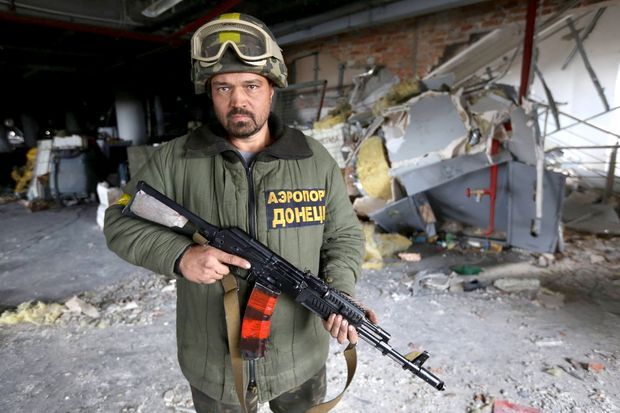
Ani Lorak’s concert did not take place in Kyiv, Iosif Kobzon refused the title of People’s Artist of Ukraine. People on the web are discussing this news, savoring bad acting skills of the Russian LifeNews’ journalist who pretends to be a victim of the “junta” or “Banderites,” or whoever they scare children in Pskov with. Instead, some people forgot about comfortable couches and cozy chairs, having volunteered to the hell of the Donetsk Airport. Perhaps, stories of these men should be broken down to the format of Twitter feeds, so the general public would finally realize the depth of the drama unfolding here and now, and the sense of real heroism and willpower.
When talking to the men who defend the Sergei Prokofiev Donetsk Airport and who were pompously baptized “cyborgs” by netizens, in the style of a 1990s action film, you do not notice this pompousness at all. You do not sense a slightest hint of pretentiousness, arrogance, or desire to attract attention. Ordinary men is the first thing that comes to mind. Ordinary men, who volunteered to go, even though they knew they might not come back. Ordinary men who quote Vysotsky, play in music bands, some of them inspired by Sergei Prokofiev’s Dance of the Knights. It is truly ferocious, aggressive, ingenious, touching music.
It happens that history is forgotten. We are surprised to hear that, according to one of the versions, Zaporizhian Cossacks fought in France, and that Hetman Sahaidachny nearly burned Moscow down. “A Hundred Years since Sich Had Died.” At first the brave and courageous were buried in former Swedish swamps during the construction of Saint Petersburg. Then we were starved to death, shot, enticed, bought, intimidated. We do not even remember that there were Belarusian and Ukrainian fronts during the World War II, but not a single Russian one. We do not pay attention to the fact that a quarter of the two-time Heroes of the Soviet Union came from Ukraine. We forget, we do not remember, but it turns out that this memory runs in the blood of Ukrainians that is being shed on Donbas land. It is time for us to forget the stale, unsavory news about all those Russian pop starlets. It is time to remember the copper smell of the spilled Ukrainian blood. It turns out that not all is lost. “You are still hurting in your pain, torn to pieces, but already tough and unsubdued,” Vasyl Stus wrote.
There are fortresses made of stone, and there are the ones in thoughts and souls. The first kind depends on the second. That zeal is somewhere in the genes, because a weak person cannot shut down their business, neglect the self-preservation instinct, and rush to meet bullets, to the sound of mines exploding nearby. There is a popular opinion that the war is somewhere far away, and it is not a war at all, just an anti-terrorist operation with truces, ceasefires, and deals. And meanwhile, the enemy is destroying a strategic object, which Ukrainians stubbornly refuse to give up. No, it ceased to be an airport a long time ago. It is a materialized fortress of spirit.
The Day presents several interviews with the men on rotation from the hell of the Donetsk Airport.
“These people are very active, they do not have pessimism”
Pavlo from Volyn oblast with callsign Dante on the worldview of people who have been through war, and on optimism at the frontline
What is going to happen after the war? Where will the men go?
“There were only volunteers among us. There were virtually no professionals. These are simple working men, entrepreneurs, doctors, who will go back to their jobs and businesses soon, after the war is over. And it means that the heroes, who consciously take this risk for their own beliefs, for their homeland, will not stay with the army. Correspondingly, it will be necessary to create the patriotic backbone of the army anew. But it is clear that the people are already seasoned and able to provide organized and resolute resistance.”
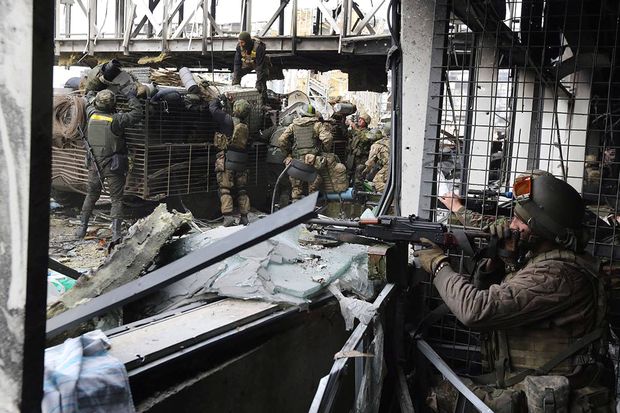
Why are you sure that the war will be over soon?
“I have my own views on the matter. I think this disaster will last for another year at the most. Today’s situation on the occupied territories is such that a lot depends on the winter.”
What motivated men, from western Ukraine in particular, to leave their cozy homes and go to war?
“It is hard to express in one sentence. There are many reasons. I asked those who fought beside me, and they told various stories. So, I will speak for myself only. When there was Maidan in Kyiv, I did not participate in it. I was disappointed after the first Maidan, and to be honest, I did not believe the second Maidan could change something. But a lot has changed in people’s consciousness, including mine, over these six months. There were a lot of Maidan participants among those who volunteered to go to war, and when I saw them and learned their views, their essence, I started regretting I had not been there with them in winter. After all, I joined the men from the Right Sector when there was recruitment for the anti-terrorist operation.”
“WE ALL MUST BE PATIENT”
The enemy wants to present our soldiers as either evil “Nazis” or as potential deserters who have been forced to go to the frontline. Who are they? What kind of men are they?
“There are ordinary people, as I have already said, there are businessmen, and activists. I will not be afraid to use this expression, they are the cream of the nation. Every other one plays the guitar, every fifth man played in a music band, a lot of them had their own businesses. They abandoned it all. These are very open men, but we had a strict commander. It is the kind of strictness which is rooted in pragmatism, mature wisdom, absolutely demanding without pampering. There was a time when we eliminated the militants without a single wounded. And we owed it to this commander’s competent job. We started losing people later, after terrorists arrived in tanks. Then we started having casualties. Believe me, I feel lower when compared to them. This is truly the cream of the nation. These men have such an advanced attitude towards life and the way they see it. I have not met better people than them.”
You say “the cream of the nation.” We can see how unsteady the government is now. Do you think they can fill governmental positions in the future? After all, can they become the government as such?
“Certainly. Moreover, after they come back from war, they will take their ideas to the masses. These are very active people, they do not have pessimism. This makes them different from many civilians. I see myself how depressed people are, how they lost faith in the government, in the future. Those who went through war have an absolutely different vision of the things. They want to act and they will act. None of them will procrastinate, because they sensed it is possible to change the world and the reality.”
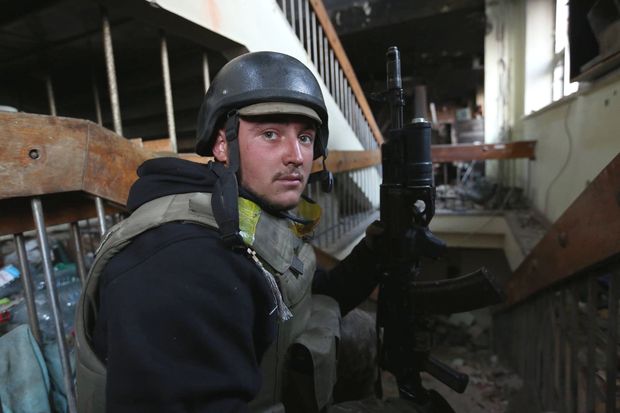
Are there talks among soldiers, perhaps even provocative ones, that they must turn back to Kyiv and settle the issue with the government with the application of force?
“Of course there are. But nobody will do this now, because they understand that the war is going on. And this is what worries everyone in the first place. Personally I did not vote for Poroshenko, but I see now how many useful things he wants to implement. The state has been destroyed throughout the whole period of its independence, and it will be impossible to set everything right in a moment. We all must be patient.”
“WE HAVE TO PRESERVE HUMANITY AND CULTIVATE KINDNESS WITHIN OURSELVES”
Did the soldiers have an impression that some steps of the high command look like treason?
“Of course, and so did I. Just think about the Ilovaisk case. A lot of men lost heart. But we understand that we do not know all the details. It is very hard to judge the consequences without knowing all reasons. We also understand that nobody forces us personally to be there. We undertook this risk voluntarily. We can leave and come back at any moment. We have a right to set specific demands for the command, and the commanders are obliged to listen to us. But we know, that we cannot demand the impossible, and especially in a situation like that.”
Did your attitude towards Donbas residents change after the participation in military operations? Is there an understanding that everything is much more ambiguous than the picture mass media are trying to install in our heads? Virtually, now you are protecting even those who were against you.
“A very peculiar war is going on now, in which a lot of people were simply fooled. I know how strong is mass media’s influence on people. By the way, my father is from Russia, I have a lot of friends there. And the main source of indignation and misunderstanding is blindness. Russians have not actually even seen Bandera’s portrait, but they tie his name to some terrible things. It has been done artificially and not overnight. That is why we need to fight it. And again, it will take some time. It will be slow but steady. We need to work with locals. A lot here depends on our attitude towards them. We shared our food with elderly ladies, because we understood how tough life can be now in some villages. We helped with many things. All in all, we have to preserve humanity and cultivate kindness within ourselves.”
What future do you see for yourself after the war?
“I want to join contract military service. But there is a problem. Unfortunately, I was born with a congenital disorder, which does not influence my physical state at all, but I have always been relieved from military service. If you take a look at me, I am an athletic type. After all, I am a candidate master for bench press. I have my own records. And it is very important for me to tie my life with the army for good, and I hope to find understanding and assistance in this matter.”
The Day’s FACT FILE
Fights for the Donetsk Airport started on May 26, 2014, after it was captured by militants. On May 27 Ukrainian soldiers forced terrorists out of the airfield and have controlled it ever since, fending off militants’ attacks almost every day. Unfortunately, many Ukrainian soldiers lost their lives defending the airport. This object is of strategic importance, since it is a crucial hub which does not let the enemy advance to Ukraine-controlled cities.
According to the messages on the Ministry of Defense website, “cyborgs,” who defend approaches and strategic objects in the Donetsk Airport area, have repelled terrorists’ attacks once more on Thursday. Our army’s positions near the village of Pisky and airport have remained steadfast. The enemy retreated.
“True patriotism is unthinkable without self-respect”
Scout Ihor from Luhansk oblast on true tests and war for your own land
Whence is this wish of guys to voluntarily defend this country? Is it true that they are virtually bursting to join battle?
“At first there was a call rather than a command. The battalion commander, a lieutenant colonel, and some other people came out and said to us: we need people to substitute the boys in the airport. Nobody expected any orders. It took some half an hour and others five minutes to think. About 25 men from our battalion offered to join in because they understood that the boys in the airport needed some rest. They asked the colonel if it was true that it was sheer hell in the airport, as it is shown on television and in the Internet. He answered in the affirmative. I can’t say I was thinking about patriotism at the moment. Above all, I thought about the same kind of soldiers who needed to be helped and replaced. There was also an inner feeling that I was doing the right thing. You see, I live 30 km from the counter-terrorism operation zone. And I know very well what this will mean for my home and my relatives if occupiers come there. It is not the Russian troops who will come there at first. The first interventionists will be the scum – looters, bandits, jail birds, and losers. They do the dirtiest work. Most of our boys, who have volunteered to defend the Donetsk airport, have higher education. Among our fighters are policemen and dentists. They are walking encyclopedias, can quote poems from memory, are keen on photography, and have excellent memory.”
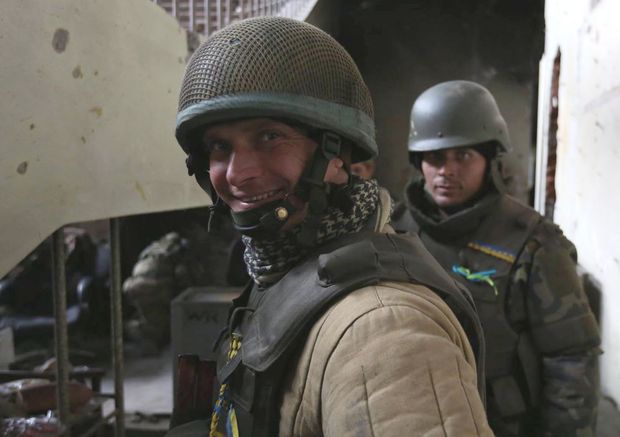
“YOU MUST ANSWER FOR YOURSELF AND NOT COMPLAIN”
What surprises awaited you in the war?
“When we were leaving, we were told we would spend three days there. But nobody doubted that we were surely going there for much more than three days. When we arrived, there was water and ammunition there. We should have taken warm clothes. We were not told this – on the contrary, we were told to take water and ammunition. When we came over, tanks refused to cover us, so we had to ride headlong and often come under fire on the move. There’s no way out: mess-ups do happen. We stayed in the forest and were supplied with neither field rations nor water for two weeks. So, we just went to a village, exchanged diesel oil for potatoes, and took some water from a well. We had no questions to the battalion commander or other superiors because we knew very well that not every supply truck could run across the fields and remain unaffected. Of course, there were outbursts of emotions at first, but then we came to understand the situation. You must answer for yourself and not complain. We all knew that we might come under enemy fire and no ambulance would come to pick us up – we would have to fight to the end. This is a real test for a man. This shows true patriotism which is unthinkable without an inner linchpin, without respect for, above all, your own self. It is a real exploit when you agree that you may go and not come back.”
“I AM FIGHTING FOR MY NATIVE LAND”
What is the soldiers’ attitude to the government?
“You no longer think there about the government and officials. There are people, there are very many volunteers, and there’s an army. We must be ready to take up arms at any moment, as is the case in Israel. I read a lot of comments in social networking sites now about how bad Poroshenko is. But I am fighting for my native land rather than for Poroshenko or the government. It’s mindless to put the blame on somebody else if you are not defending you home by yourself. I will tell you frankly: whether or not we are supplied with clothes, we have volunteers and other people who will always support us. I’ve just come home on leave, wearing the winter pants that volunteers brought us because we had worn summer clothes before that. We could refuse to take part in defending the airport. We had this opportunity. But we went there for some reason. I am an ordinary man. I worked in Donetsk, at Luhansk region coal mines…”
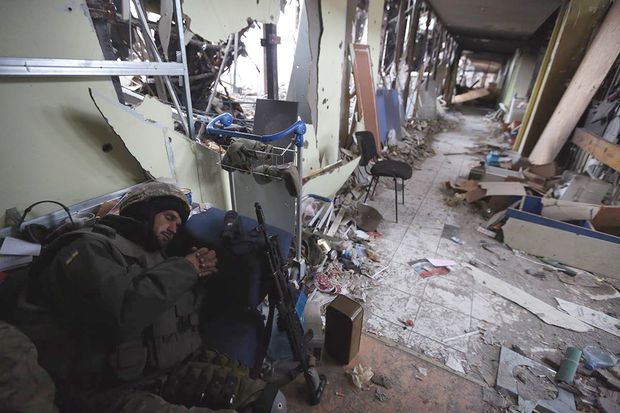
And what is your impression of the coal miners? Why did some of them sign up for bandit units?
“When the Maidan began, I was in Rovenki. I mingled with local guys who spoke pidgin Ukrainian and were for Ukraine. The Donbas hated Yanukovych even then. They talked about ‘the Family’ and wondered when the latter would be ousted. After the Maidan, when I had already gone from that place to my homeland, a former colleague of mine called me and said caustically that we had welcomed too well the ‘Banderaites’ in the person of Avakov. What caused this change of mood? Television! There was a lot of brainwashing – even on the nationwide scale. I can’t say it is over now. I have very many questions to our media. They played am awful role at the time. Nobody explained in clear-cut terms what the Maidan was striving for. Nobody put it across the people in the east that everybody had the same problems and expectations. On the contrary, someone convinced them that Russia would come and keep them all well-fed. Those people were ready to follow the one who will pay them more. They swallowed this bait. What has always made me shudder is their usage of the word ‘owner’ in the meaning of ‘chief.’ They were going to be hired, not to work, and to receive, not to produce.”
When you came back home for a while, what changed in your awareness?
“I was on a 15-day leave. I know that some boys even drank at this period. This sometimes happened because they needed to ease the crazy stress in some way. I am a teetotaler perhaps because my psyche is stable and I don’t need to relax in this way. But I wanted to see nobody – even my relatives. I didn’t want to chat and answer questions. I wanted to stay alone. I just strolled down the riverside and avenues. I listened to people on public transport and sometimes cut in on their conversations. It was very distressing to see that some people did not understand what was going on, so I had to say to them: ‘Wake up! An enemy has come, who wants to destroy us or drive us out of our homes.’ This does not come home to everybody. Some are unaware of the danger and the woes the war is bringing along.”
“AN INNER DESIRE TO BE BETTER IN THE PEOPLE’S EYES”
What were you afraid most of all at the airport?
“First there was a fear of explosions. You are keenly aware that if you are hit, nothing will be left of you. Then this fear passes, and you get adapted. Then this fear gives way to another. You recall your parents and think about how it will hurt them if you are killed. You try to wave these thoughts away, but it’s hard to do so. It is not even a fear – it is a depressed state of your spirit, and you must overcome it. But the war quickly ‘knocks out’ this mood, too. There is also a fear to be taken prisoner because you know that you will be tortured. But even this fear goes. What remains finally? I remember Vysotsky’s song ‘The Ballad of Fighting,’ and I have now understood and felt deeply the phrase ‘the secret of the word ‘command.’ It is when you’ve been ordered to face, assault rifle in hand, an enemy armada. And it is clear to you that, no matter how absurd the command is, you must fulfill it even at the cost of your life. You know you won’t go anywhere. Not to retreat is a strange inner sensation. You will stand, hide in the shelter, and change location, but you will not retreat because you are aware of being in your own land. You see people in the village, buy foodstuffs from them, and do not want them to think that you are worse than those bandits or just similar to them. This inner process brews a cocktail of feelings, emotions, and principles. It is no longer the fear of looking bad, it is an inner desire to be better in the people’s eyes. For we did not steal from but gave them foodstuffs, we gave canned meat to kids, shared medicines, exchanged our phone numbers, and thanked each other. We fueled their generators when they had a power cut, so that they could recharge their cell phones and watch TV. By the way, we watched Novorossia news bulletins together and laughed heartily at the absurdities the pro-Russian channels beamed. And, even though the local residents’ views were sometimes disputable, we had mutual understanding. The locals would take me, a bomb disposal specialist, to the places where they had spotted unexploded projectiles and mortar shells. Incidentally, kids can guess the mortar’s caliber by the crater. They know the difference between an infantry combat vehicle and an APC. Can you fancy that? They are children of war! A man once approached me and said bluntly: ‘You guys better go.’ The man knew what would happen if those who called themselves ‘militia’ and were in fact bandits came. This imposes a high responsibility. I think you get me. I kept in my bulletproof jacket the drawings the children brought me. It was out of the question to dispose of them – say, to kindle a bonfire with or throw them away.”
The Day’s FACT FILE
Sergei LOYKO (1953), journalist, translator, writer, photographer.
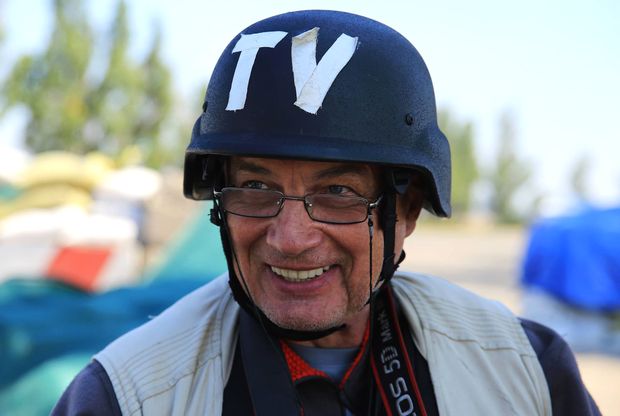
He graduated from Moscow State Pedagogical University. Before launching a career in journalism, saw service in the strategic missile troops, then taught the English language. Now he works for the newspaper Los Angeles Times (US), contributes to Novaya gazeta and Moscow’s Echo radio station. Author of spot reports from the areas of military-political conflicts in the former USSR and other foreign countries, particularly Afghanistan and Iraq.
Sergei Loyko covered the Ukrainian Revolution of Dignity. He is now filming the war in eastern Ukraine. In late October he spent four days at the Donetsk airport, filming the everyday exploits of its defenders. He later wrote on his Facebook page: “Many wives, mothers, friends, and relatives recognize their darlings on my photographs and write to me. Even this alone could be the reason why I was there – to make them see their kith and kin over there.”
Den’s editorial board extends its gratitude to Mr. Loyko for permission to use the unique stills published on his Facebook page.






